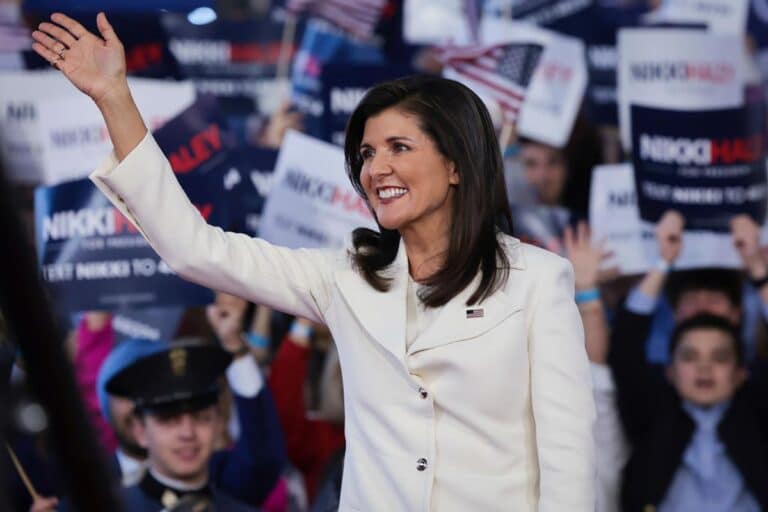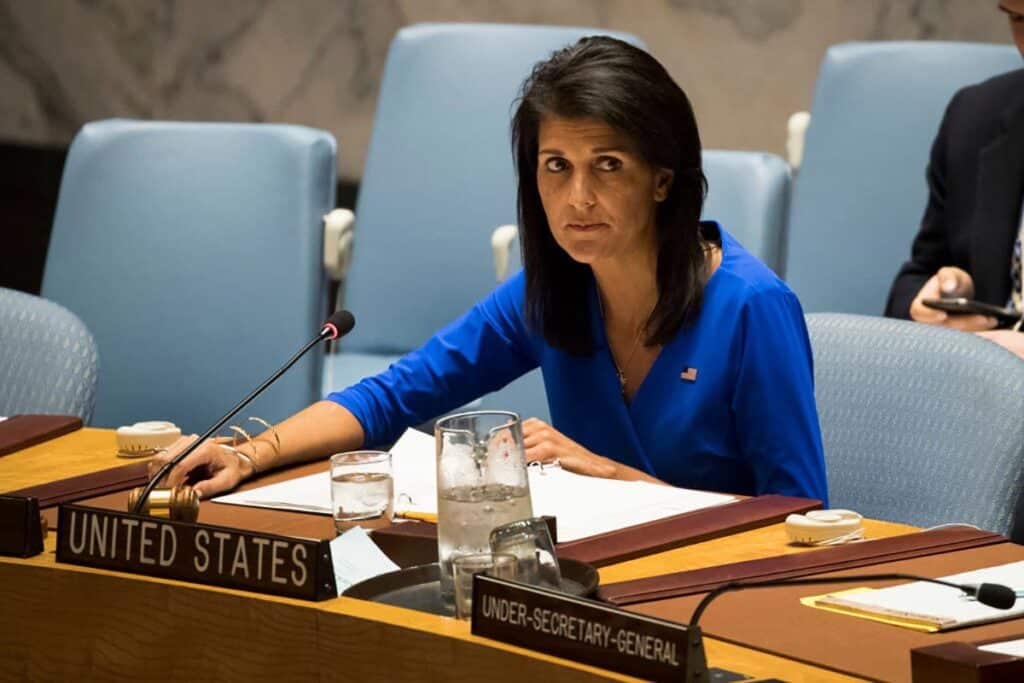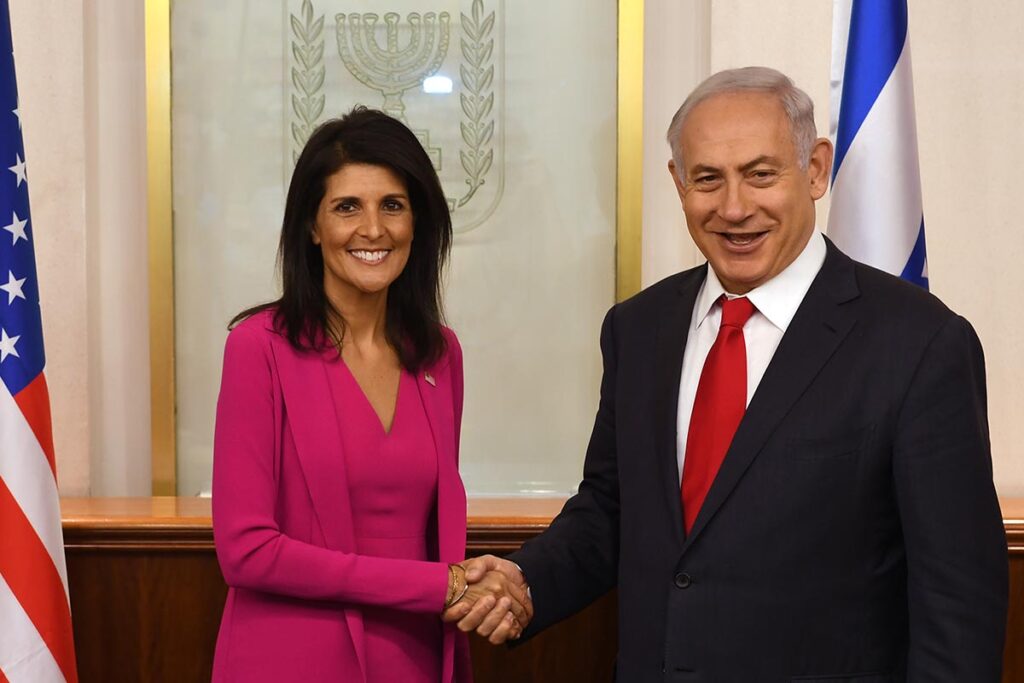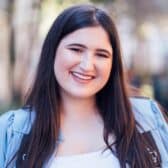
Former U.S. Ambassador to the United Nations and South Carolina governor Nikki Haley has firmly expressed her support for Israel throughout her political career. During Wednesday night’s Republican primary debate, she sparred with biotech entrepreneur Vivek Ramaswamy over funding for Israel.
Haley is not Jewish — she was raised as a Sikh and later converted to Methodist Christianity. However, the South Carolina native has a long history of supporting the Jewish people and the State of Israel.
While her stances on issues such as abortion and gun control may not align with the views held by many American Jewish voters, she continues to receive significant support within certain segments of the community. In fact, the Republican Jewish Coalition recently hailed the 51-year-old as the “best candidate for Jewish Republicans.”
Here’s an in-depth look at Nikki Haley’s Jewish and Israel connections.
The basics
Nikki Haley was born on January 20, 1972, in South Carolina to parents who immigrated from Punjab, India.
Growing up in Bamberg, South Carolina, Haley faced bullying by the neighborhood kids due to her Indian heritage. This experience greatly influenced her views, particularly concerning Israel.
Speaking at a Jewish Federation event in 2019, she reflected, “We were the only Indian family in a small southern town, and we weren’t white enough to be white or black enough to be black.”
“My mom would always say, ‘Your job is not to show them how you’re different, but to show them how you are similar,’” she added.
Haley has often credited these childhood experiences as foundational to her strong stance against the “bullying of Israel.” She believes Israel is unjustly singled out on the international stage. She held these memories close during her tenure as the U.S. ambassador to the U.N.
“The Middle East is a really tough neighborhood, and it was for that reason that I felt it was so important to fight, because we do share values with Israel, and we share our need for democracy,” Haley said. “It was letting them know they weren’t going to push Israel around. They’d have to come through me.”
Elected to the South Carolina House of Representatives in 2004, she served three terms. In 2010, she made history as the first female governor of South Carolina. After serving two terms as governor, she was named ambassador to the U.N., becoming the first Indian American to serve in a presidential cabinet.

As governor, Haley signed the first statewide anti-BDS ban into law
While serving as the governor of South Carolina, Haley signed the first statewide ban of public entities from engaging in the BDS (Boycott, Divestment, Sanctions) movement against Israel.
Although the 2015 law does not explicitly mention Israel, it references businesses engaging in the “boycott of a person or an entity based in or doing business with a jurisdiction with whom South Carolina can enjoy open trade.” Haley, along with many supporters and opponents of the legislation, have said it’s widely regarded as referencing Israel.
At that point, Haley said she had “very little interactions with Israel,” but passed the anti-BDS legislation because “it was the right thing to do.”
The South Carolina law paved the way for 36 other states to enact legislation against boycotting Israel.
“The effort to delegitimize the state of Israel being waged on college campuses and the anti-Israel obsession at the U.N. are one in the same. They both seek to deny Israel’s right to exist,” Haley later said at a U.N. event.
Haley was a vocal supporter of Israel as ambassador to the UN
In January 2017, Haley became the U.S. ambassador to the U.N. Taking the stage at the World Jewish Congress’ Plenary Assembly that April, Haley announced “a new day for Israel at the United Nations,” adding, “The days of Israel bashing are over.”
Too often antisemitism is falsely masked as being anti-Israel. This violence against our Jewish brothers and sisters should be a wake-up call.
— Nikki Haley (@NikkiHaley) May 22, 2021
Hate is never the answer.
“As long as I’m America’s representative at the U.N., I am going to stand for human rights and I am going to stand for the truth. And that means I am going to stand for Israel,” she added.
One of her most significant moves was in June 2017 when she withdrew the U.S. from the U.N. Human Rights Council, citing its “relentless, pathological campaign” against Israel.
Haley particularly criticized the Human Rights Council for its hypocrisy, pointing out countries like Saudi Arabia and Venezuela with notable human rights abuses, which, in her view, weren’t scrutinized as heavily as Israel.
To offer some perspective on the U.N.’s stance on Israel: Between 2015 and 2022, the U.N. General Assembly approved 140 resolutions critical of Israel, compared to just 68 against other nations. Notably, in 2022, it passed more resolutions targeting Israel than all other countries combined.
She also used her role to block the appointment of former Palestinian prime minister Salam Fayyad as the U.N. envoy to Libya. Haley said that the appointment went against U.S. policy toward Israel, as it did not recognize a Palestinian state.
“For too long, the U.N. has been unfairly biased in favor of the Palestinian Authority to the detriment of our allies in Israel,” Haley said. “The United States does not currently recognize a Palestinian state or support the signal this appointment would send within the United Nations.”
She was a strong advocate of the U.S. moving its embassy to Jerusalem

In 2017, Haley expressed her support for relocating the U.S. embassy in Israel from Tel Aviv to Jerusalem.
That December, the General Assembly overwhelmingly passed a resolution condemning then-President Donald Trump’s recognition of Jerusalem as Israel’s capital and his decision to move the embassy.
In response, Haley criticized the majority of nations, asserting they were infringing on U.S. sovereignty. She used the U.S.’s veto power in the Security Council for the first time in six years and warned, “The U.S. will be taking names” of countries that opposed the move.
At the UN we're always asked to do more & give more. So, when we make a decision, at the will of the American ppl, abt where to locate OUR embassy, we don't expect those we've helped to target us. On Thurs there'll be a vote criticizing our choice. The US will be taking names. pic.twitter.com/ZsusB8Hqt4
— Archive: Ambassador Nikki Haley (@AmbNikkiHaley) December 19, 2017
Prime Minister Benjamin Netanyahu welcomed the move, calling it “courageous and just.” Many Knesset members across the political spectrum also praised the announcement. On the other hand, Palestinian Authority President Mahmoud Abbas vehemently opposed the decision, arguing that it further diminished the U.S.’s role as an impartial mediator.
Meanwhile, the U.N., European Union and several countries criticized the move, perceiving it as a unilateral step that might hinder peace negotiations.
Haley has visited Israel multiple times
Haley first visited Israel as the U.S. ambassador in June 2017. During this trip, she met Israeli Prime Minister Benjamin Netanyahu and former President Reuven Rivlin.
Haley expressed her frustration at the U.N. to Netanyahu, saying, “If there’s anything I have no patience for, it’s bullies, and the U.N. was being such a bully to Israel because they could.”
Aiming to deepen her understanding of the Israeli-Palestinian conflict, she toured both Israel and the Palestinian territories.
Reflecting on the experience, Haley said, “It was just special. You can’t go to Israel and not feel blessed. We went to the Palestinian community and to Jerusalem and really got a feel for it. What I immediately fell in love with was the spirit of the people.”
In 2019, Haley revisited Israel for a personal vacation with her family. Two years later, she returned to the Jewish state on a “solidarity mission” with Christians United for Israel.
Haley criticized AOC over her stance on Israel
In July 2023, Haley took aim at Alexandra Ocasio-Cortez, Rashida Tlaib, Ilhan Omar, and six other Congress members for voting against a resolution. This resolution declared that Israel “is not a racist or apartheid state,” affirmed a commitment to reject antisemitism and xenophobia in all its forms, and asserted that the U.S. “will always be a staunch partner and supporter of Israel.”
Haley tweeted, “These nine members of Congress believe Israel is racist. We will remember this vote.”
We’re taking names.
— Nikki Haley (@NikkiHaley) July 19, 2023
Alexandria Ocasio-Cortez
Rashida Tlaib
Jamaal Bowman
Summer Lee
Ilhan Omar
Cori Bush
Andre Carson
Delia Ramirez
Ayanna Pressley
These 9 members of Congress believe Israel is racist. We will remember this vote.
AOC fired back, calling Israel an “apartheid” state and accusing Haley of “ignor[ing] human rights abuses against Palestinians.”
Haley retorted: “Why does Israel get under your skin? Because it’s democratic, pro-American, or Jewish? You don’t get worked up about massive human rights violations in China, Iran, Cuba, & Venezuela. You all would fit in great with the antisemites at the United Nations.”
Why does Israel get under your skin? Because it’s democratic, pro-American, or Jewish?
— Nikki Haley (@NikkiHaley) July 20, 2023
You don't get worked up about massive human rights violations in China, Iran, Cuba, & Venezuela.
You all would fit in great with the anti-Semites at the United Nations. https://t.co/arE9BTwWtb
Nikki Haley and Vivek Ramaswamy sparred over aid to Israel at the GOP debate
Haley has been a vocal critic of Vivek Ramaswamy’s proposal to end U.S. aid to Israel. Ramaswamy suggested cutting aid to Israel by 2028, when the current U.S. agreement to give $3.8 billion annually to Israel expires.
The entrepreneur said that by 2028, Israel should be in a position where it will not need U.S. support as it continues to sign peace treaties with Middle Eastern countries. Ramaswamy views this cut in aid as “part of a broader disengagement with the Middle East.”
“Vivek Ramaswamy is completely wrong to call for ending America’s special bond with Israel,” Haley told Jewish Insider. “Support for Israel is both the morally right and strategically smart thing to do. Both countries are stronger and safer because of our iron-clad friendship. As president, I will never abandon Israel.”
During Wednesday night’s GOP debate, as candidates discussed whether they would support continued funding to Ukraine, Haley turned the conversation to Israel.
“The problem that Vivek doesn’t understand is, he wants to hand Ukraine to Russia, he wants to let China eat Taiwan, he wants to stop funding Israel. You don’t do that to friends,” Haley said, adding that the 37-year-old didn’t understand foreign policy or the U.S. relationship with Israel.
“It’s not that Israel needs America. America needs Israel. They’re the frontline of defense to Iran,” she added.
What does the Jewish community think about Haley?
While many Jewish organizations and leaders applaud Haley for her staunch support for Israel, not everyone within the community agrees. Critics both of Israel and of other elements of her platform argue that she’s not the right candidate for 2024.
Supporters celebrate Haley’s clear stance against the BDS movement and her consistent defense of Israel at the U.N. To this camp, Haley represents a rare voice in international politics who consistently stands with Israel.
Jay Lefkowitz, a former adviser to President George W. Bush and Haley supporter, told The Forward that he believes she’s the best candidate to support Jewish causes and Israel. “She is principled and focuses on policy instead of the politics of personal destruction,” Lefkowitz said, adding that Haley, as governor, had “broad support from both sides of the aisle.”
However, others within the Jewish community, particularly among more liberal or progressive groups, view Haley’s candidacy differently. They believe that her staunch pro-Israel stance may sometimes overlook the complexities of the Israeli-Palestinian conflict and Palestinian rights.
For instance, J Street, a liberal Jewish advocacy group, called out Haley’s policies as “anti-Palestinian.” The organization criticized Haley’s blocking of Fayyad’s appointment as discriminatory based on his country of origin.
“Haley’s aim to combat the anti-Israel bias of some U.N. bodies is admirable. But it won’t be accomplished by imposing anti-Palestinian policies. It certainly won’t be accomplished by shutting out widely respected Palestinians like Fayyad who have dedicated themselves to the cause of Israeli-Palestinian peace,” JStreet wrote.
However, Simone Levinson, an independent who was formerly involved in the Democratic Party, told The Forward that she was inspired by Haley’s support for Israel. “What I love about her is that she proves that you don’t have to be a bully to stand up to a bully,” she said.
Originally Published Aug 25, 2023 04:20PM EDT
